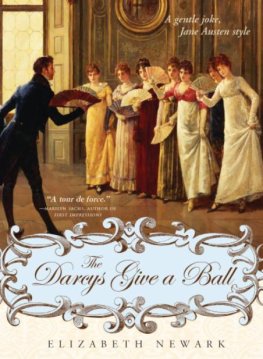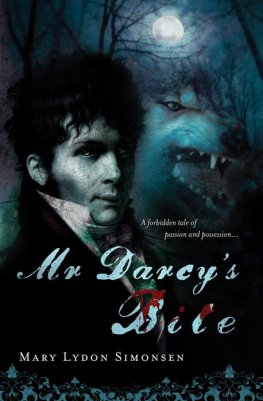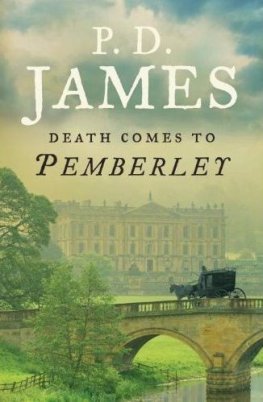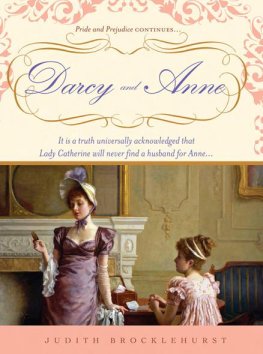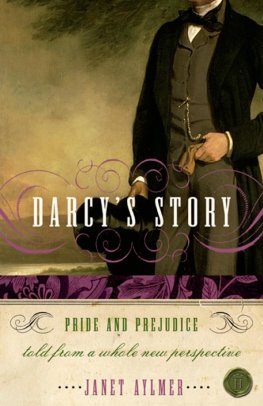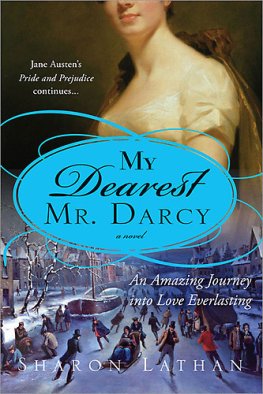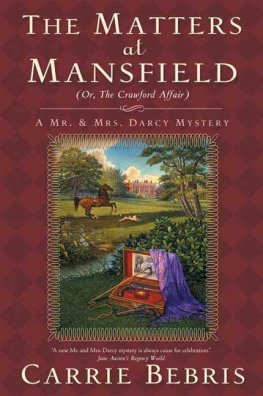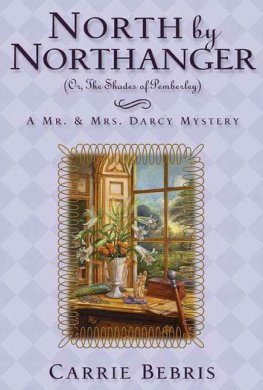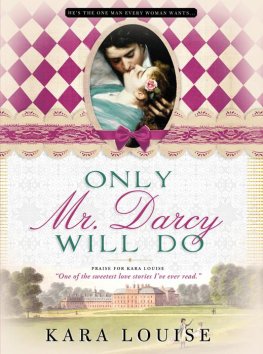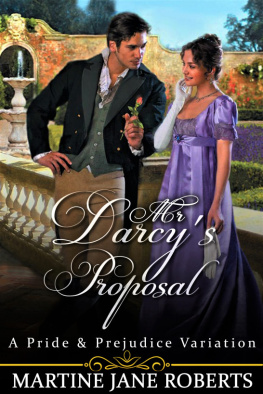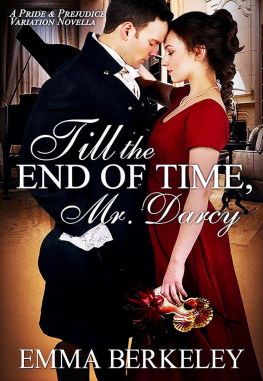Elizabeth Newark
The Darcys Give a Ball
This book is dedicated to
my daughter, Penelope,
and my son, Hugh,
with much love.
Mr. Collins was not a sensible man, and the deficiency of
Nature had been but little assisted by education or society;
the greatest part of his life having been spent under the guidance
of an illiterate and miserly father.
Jane Austen
Harkee, Willem, said old Isaac Collins to his son. Jest you wait. Itll come to ee.
He hawked, scraping his throat with an unpleasant retching sound, and spat into the sputum jar resting on the arm of his chair.
Yerss, everythin comes to im that waits.Youll get un in the end, Bennetses or no Bennetses. Top lofty, thats them, aspendin money that rightly should be mine. But youll see. Their bloods arunnin thin.
Young William Collins, standing to one side of his father (out of reach, he hoped, of any sudden blows from the stout walking stick that leaned against the wall), indicated his agreement. Yes, father, he said meekly.
An you keep your nose outa them books. Book-learnin never did no-one no good.
Yes, father.
The mills o God grind slow, but they grind exceedin small, croaked his father. Appen I wont live to see the day. Arrr, Im not long for this world. But youll get un. He sniffed long and hard, then blew his nobby and reddened nose with a discoloured kerchief and gazed at the result. Now, you get me a posset and dont ee be asparin o the wine. Off with ee, boy! he yelled, suddenly raising his voice and snatching at the stick. Rouse that lazy ragbag in the kitchen. Time she earned er keep.
Y-y-Yes, Father, said William Collins.
Chapter One
Hunsford Parsonage
...and considering Mr. Collinss character, connections, and
situation in life, I am convinced that my chance of happiness
with him is as fair as most people can boast on entering the
marriage state.
Poor Charlotteit was melancholy to leave her to such
societyBut she had chosen it with her eyes open.
Jane Austen
Mrs. Collins?
Mrs. Collins? Mrs. Collins!
As his voice rose, Mr. Collins struggled to his feet. The letter he was reading slid through his hands and he snatched at it as it fell to the floor. His chair tipped over behind him unnoticed.
It is a truth universally acknowledged that to be heir to an estate is eminently less satisfying than to be in possession of that estate. Mr.William Collins, the Rector of Hunsford, had lived with his expectations throughout a good part of his lifetime. At first, the expectations had been those of his father, and had arisen once it became apparent that Mr. Bennet, the owner of Longbourn (the estate which was entailed on the older Mr. Collins), and the father of five daughters, was unlikely to be presented with a son by his wife. The senior Mr. Collins, an illiterate and miserly man, had inherited a quarrel with the Bennet branch of the family, which he continued to enjoy, gloating on occasion to his son over the fact that the quarrel would be finally resolved on the day the Longbourn estate became his. An eye for an eye! snarled the father. So perish the ungodly! (Young Mr. Collins had no idea of the cause of the rift or what, if anything, made these quotations appropriate.)
The son, raised in subjection and humility, had as a means of escape chosen the Church as his career, spurred on perhaps by his fathers quotations from the Scriptures. Shortly after his ordination, he had by a most fortunate chance been recommended to Lady Catherine de Bourgh at a time when the living of Hunsford, which was in her gift, was vacant. The respect he felt for her high rank, and his veneration (nay, near adoration) of her as his patroness, had filled the shell of his personality left empty by his fathers constant belittlement and, as a result of her approbation, he had arrived at a very good opinion of himself, of his authority as a clergyman, and of his right as a rector. He became a curious (to some people insufferable) mixture of pride and obsequiousness, self-importance and humility.
Lady Catherine, for her part, found him exactly to suit her requirements.Veneration (nay, near adoration) she felt to be her due.
On his fathers death, when Mr. Collins in his turn became heir to Longbourn, he began to feel a certain curiosity regarding those five cousins he had never seen, the daughters of Mr. Bennet. The fathers contempt for the son had taught him in his youth to feel unworthy; the sudden boosting of his self-esteem by his early success in obtaining an excellent living drove those feelings underground; they emerged afresh as a feeling of guilt towards his cousins, mixed with a strong and somewhat prurient interest in them as females (his mother had died shortly after his birth and there had been little exposure to the gentle sex in his life). To assuage this guilt, he sought a reconciliation by letter with Mr. Bennet, telling himself it was his duty as a clergyman, but he had another aim: he had a wife in view. His fathers effect on Mr. Collins was such that, even after the fathers death, the son felt uncomfortable about seeking a reconciliation. He bent over backwards to conciliate both Mr. Bennet and his dead fathers shade. He wrote as follows:
The disagreement subsisting between yourself and my late honoured father, always gave me much uneasiness, and since I have had the misfortune to lose him, I have frequently wished to heal the breach; but for some time I was kept back by my own doubts, fearing lest it might seem disrespectful to his memory for me to be on good terms with any one, with whom it had always pleased him to be at variance.
Thus advancing and retreating as if taking part in a country dance, Mr. Collins moved towards his goal. It was Mr. Collinss misfortune that when he visited Longbourn for a reconciliatory visit, of the two cousins he settled on in turn as a likely wife, first Jane, then Elizabeth, Jane was being courted by another man, and Elizabeth was of a degree of intelligence and a turn of humor that prevented her taking his offer seriously. Mary Bennet might well have been receptive to his suit but was not given the chance. As it was, Charlotte Lucas, daughter of Sir William Lucas, and close friend of Elizabeth Bennet, knowing herself to have little chance of marriage otherwise, threw herself in his way. Affronted and humiliated by Elizabeths refusal, Mr. Collins had not questioned his own good fortune in finding Charlotte Lucas conveniently on his doorstep, so to speak. Like the Hunsford living, she had dropped into his hands; he accepted this gift from the gods and they were married as soon as conveniently possible.
Mr. Collins might well have allowed his resentment toward Elizabeth Bennet to congeal into a new breach with the Bennet family, but this his wife would not permit. And Elizabeths marriage to Mr. Darcy, wealthy nephew of Lady Catherine, had confirmed to him that it would be best to be on good terms with the Bennets. At the time of the marriage, Mr. Bennet wrote to Mr. Collins as follows:
Console Lady Catherine as well as you can. But, if I were you, I would stand by the nephew. He has more to give.
Mr. Collins deplored what he had often felt was a certain flippancy in Mr. Bennets tone but, on due consideration, he felt the advice to be sound. He therefore, over the years, continued to bow down to Lady Catherine, while taking comfort in the knowledge that his wife was in regular correspondence with her dear friend, Mrs. Darcy.
When finally, twelve years later, the news reached him that the estate was his, he reacted with what can only be termed high glee. Mrs. Collins? Mrs. Collins? Longbourn is mine at last! Mrs. Collins!

